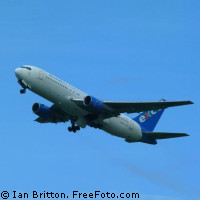Night time noises boost blood pressure, study shows
Night time noises, such as aircraft roaring overhead or traffic passing by outside, can cause a person's blood pressure to rise, even if it does not wake them. This is the conclusion of a new study by the EU-funded HYENA ('Hypertension and exposure to noise near airports') project, which has just been published by the European Heart Journal. The results highlight the need to reduce noise levels from aircraft to protect the health of those living near airports. The World Health Organisation defines high blood pressure (which is also known as hypertension) as being 140/90 mmHg or higher. Sufferers have an increased risk of developing heart disease, stroke, kidney disease and dementia. Noise disturbance during sleep is recognised as one of the most damaging aspects of environmental noise exposure for our health. Studies in sleep laboratories have demonstrated that noises can affect both blood pressure and heart rate. However, so far there have been few studies investigating this effect outside the laboratory. In this latest piece of research, the scientists monitored the blood pressure of 140 sleeping volunteers in their homes near four major European airports: London Heathrow (UK), Malpensa (Milan, Italy), Athens (Greece) and Arlanda (Stockholm, Sweden). Noise levels in the bedroom were measured digitally, and the volunteer's blood pressure was taken automatically every 15 minutes. The results revealed that blood pressure increased noticeably after a 'noise event' louder than 35 decibels, even if the volunteer remained asleep and so was not consciously disturbed. On average, aircraft noise events caused systolic blood pressure (when the heart contracts) to rise by 6.2 mmHg and diastolic blood pressure (when the heart relaxes) to go up by 7.4 mmHg. Louder noises caused greater increases in blood pressure; for every 5 decibel increase in aircraft noise, systolic blood pressure went up by an average of 0.66 mmHg. Similar results were observed for other noise sources such as road traffic, suggesting that it is the volume of the noise, and not its origin, that determines the effect on the sleeper's blood pressure. 'We know that noise from air traffic can be a source of irritation, but our research shows that it can also be damaging for people's health, which is particularly significant in light of plans to expand international airports,' commented Dr Lars Jarup of Imperial College London, one of the authors of the study. 'Our studies show that night-time aircraft noise can affect your blood pressure instantly and increase the risk of hypertension. It is clear to me that measures need to be taken to reduce noise levels from aircraft, in particular during night-time, in order to protect the health of people living near airports.' Previous research by the HYENA consortium revealed that people who have been living under the flight path of an international airport for at least five years are more likely to develop high blood pressure than those living in quieter areas. The scientists now plan to investigate whether combined exposure to noise and air pollution increases the risk of heart disease. The HYENA project was funded under the 'Quality of life and management of living resources' thematic area of the Fifth Framework Programme (FP5).
Countries
Greece, Italy, Sweden, United Kingdom



